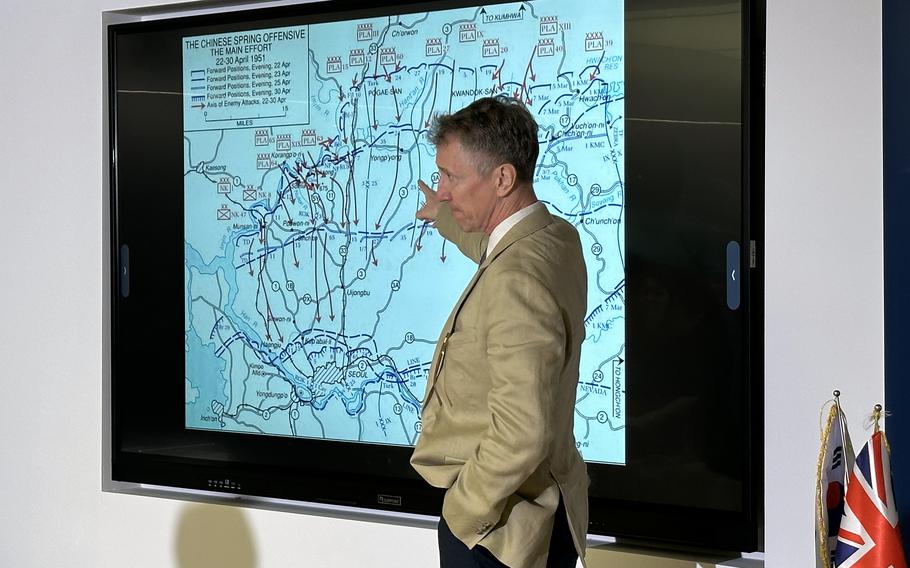
British Korea War Memorial Committee co-chair Andrew Salmon talks about the Battle of Imjin River during a press conference at the British Embassy in Seoul, South Korea, July 25, 2025. (David Choi/Stars and Stripes)
SEOUL, South Korea — British expatriates commemorating the United Kingdom’s role in the Korean War have launched a video walking tour marking their country’s bloodiest battle since World War II.
The Seoul-based nonprofit British Korea War Memorial Committee unveiled the video series, “Stand in the Bootprints of Heroes: Battle of Imjin River,” on Friday. The series recounts how a British brigade held off the largest Chinese assault of the war, beginning April 22, 1951.
Visitors to the battlefield in Paju, about 25 miles north of the capital, can scan QR codes on 11 signs to access English-language YouTube videos, which include Korean subtitles.
The $22,000 project was funded by private companies and Dulwich College, committee treasurer Daniel Fertig said during a press conference at the British Embassy in Seoul.
The digital memorial is a passionate tribute for Korean War veterans and a way “to keep their stories alive,” British Ambassador to South Korea Colin Crooks told reporters.
“As the number of living veterans declines, our duty to preserve their legacy becomes more urgent,” he said.
The Battle of Imjin River cost more British lives than two decades of fighting in Afghanistan, said Commodore Andy Lamb, the U.K. defense attaché in Seoul.
“It is the most ferocious and costly battle fought by the British army since World War II,” he added.
The three-day battle began when Chinese forces crossed the Imjin River at night, near the western border between North and South Korea, pushing into U.N.-held territory.
Although the hillside terrain provided soldiers of the 29th British Independent Infantry Brigade Group an advantage against the advancing Chinese troops below, their dispersed positions limited their ability to receive reinforcements during the ordeal.
Overwhelmed by incoming Chinese, the U.N. troops retreated. The British brigade suffered over 1,000 casualties, about 25% of its total force, according to the United Kingdom’s National Army Museum.
The battle was noteworthy as the last major Chinese offensive in the 1950-53 Korean War, committee co-chair Andrew Salmon told Stars and Stripes at the embassy.
“After this, the war went static,” he said. “For the second two years, the Korean War got no media attention, very little popular culture attention.”
The Korean War, also referred to as the Forgotten War, went widely unnoticed by Britons at home, Salmon said.
“We were fighting for and alongside the Americans, arguably more so than for the South Koreans,” he said. “It just fell into the gaps in historical memory and popular cultural memory.”
More than 1,100 British troops were killed during the three-year war, according to South Korea’s Ministry of Patriots and Veterans Affairs.